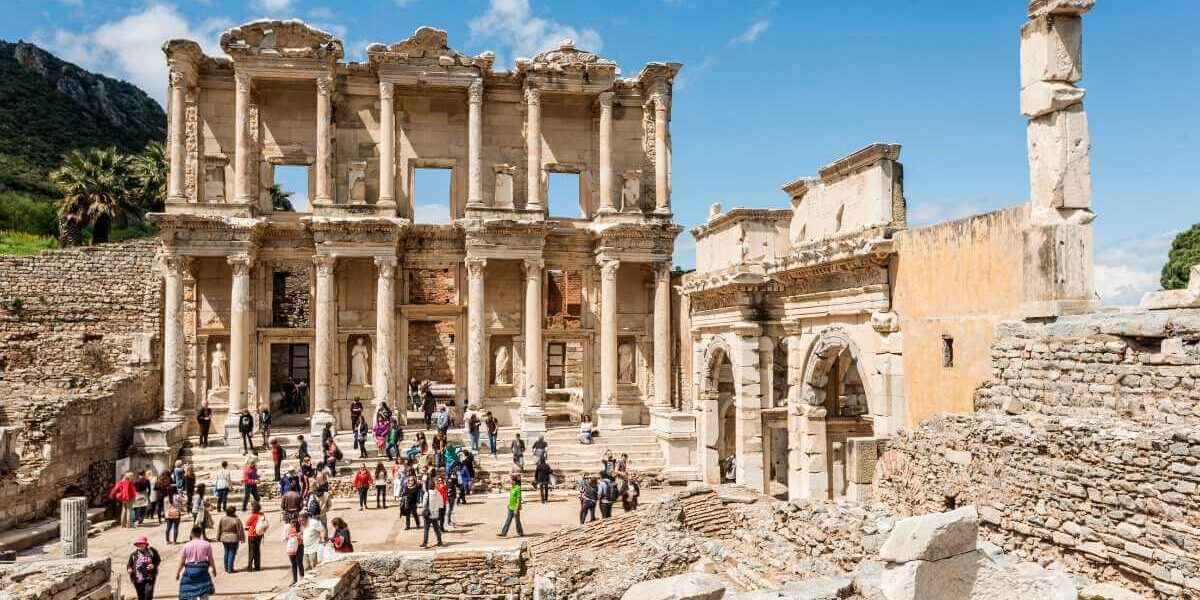Introduction to Ephesus
Ephesus, once a bustling port and cultural hub, remains a monumental archaeological site today. Nestled along the Aegean coast of modern Turkey, this ancient city presents a vivid glimpse into its illustrious history, showcasing the power struggles, religious influences, and architectural wonders from its Greek foundations to the zenith of Roman glory.
Greek Origins: The Birth of Ephesus
Founded around the 10th century BCE by Attic and Ionian Greek settlers, Ephesus has roots that delve deep into mythology as well, with legends claiming its name originates from an Amazonian queen. Central to the city’s spiritual life was the Artemision, a grand sanctuary dedicated to the goddess Artemis.
In the Archaic Period, Ephesus emerged as a pivotal site for worship and pilgrimage, highlighted by the Temple of Artemis, celebrated as one of the Seven Wonders of the Ancient World. This architectural masterpiece showcased the city’s wealth and its significant spiritual influence in the Greek world.
The Rise under Persian and Hellenistic Rule
In the 6th century BCE, Ephesus fell under Persian control, yet Greek customs and traditions persisted. The city underwent significant transformations following Alexander the Great’s conquests in the 4th century BCE. This era marked a Hellenistic revival wherein Ephesus transformed into a major urban center, blending cultural elements from both Greece and the East.
A notable figure during this period was Lysimachus, one of Alexander’s generals, who relocated the city to a more secure inland site and constructed formidable walls to safeguard it, setting the stage for future Roman expansion.
The Roman Golden Age of Ephesus
Ephesus reached unparalleled heights under Roman dominion, emerging as the capital of the Roman province of Asia Minor. At its peak, the city was home to over 250,000 residents, making it one of the most populated cities in the Roman Empire.
During this flourishing era, monumental constructions dotted the city:
The Library of Celsus: Established in the 2nd century CE as the third-largest library of antiquity.
The Great Theatre: Accommodating 25,000 spectators, it served as a venue for gladiatorial contests and theatrical performances.
The Temple of Hadrian: A lavish monument that fused Roman grandeur with Greek artistic elements.
The Agora and Marble Road: Lively hubs for trade and civic engagement.
As a vital religious center, Ephesus witnessed the emergence of early Christianity and was mentioned in the Book of Revelation. The nearby House of the Virgin Mary, believed by some to be her final abode, further amplified the city’s spiritual significance.
Decline and Rediscovery
The decline of Ephesus began in the 3rd century CE, triggered by repeated invasions, natural disasters, and the gradual silting of its harbor, disrupting vital trade routes. By the 15th century, the city had lost much of its prominence.
However, the story of Ephesus wasn’t over. Archaeological excavations, notably from the late 19th century onward, unveiled its buried glory and preserved the ruins for modern exploration. Today, Ephesus stands as one of the most extensive and well-preserved ancient sites globally, drawing millions of visitors annually.
The Indelible Legacy of Ephesus
Beyond mere ruins, the history of Ephesus unfolds as a narrative of cultural continuity—from its Greek roots to Roman splendor and early Christian influence. Wander through the city today and marvel at the colonnaded streets that resonate with whispers of past civilizations, architectural wonders, and rich cultural exchanges.
Traveler’s FAQ
Q: When was Ephesus established? A: Ephesus was originally founded around the 10th century BCE by Greek settlers, although older evidence suggests earlier habitation.
Q: Why is Ephesus historically significant? A: Ephesus functioned as a major center for trade, religious practices, and politics across both Greek and Roman civilizations, also playing a pivotal role in early Christianity.
Q: What are some highlights to visit in Ephesus today? A: Must-see attractions include the Library of Celsus, the Great Theatre, the Temple of Hadrian, and remnants of the Temple of Artemis.
Q: Does Ephesus feature in the Bible? A: Yes, Ephesus is referenced in the New Testament and is recognized as one of the Seven Churches in Revelation.
Q: How long is a typical visit to Ephesus? A: Tours usually last 2–3 hours, but history lovers might appreciate a more in-depth half-day or full-day exploration.
Embarking on Your Ephesus Adventure
The tale of Ephesus is inscribed in its stones—an account of empires, faiths, and innovations that captivates travelers and scholars alike. From its Hellenic origins to its apex under Roman rule and its place in early Christian history, Ephesus offers an unparalleled educational journey through civilization.
To truly experience this historic site, consider utilizing GetTransfer.com for your travel arrangements. The platform enables travelers to select specific vehicles and enjoy transparency in service details—allowing for a customized and seamless journey to explore Ephesus. Leverage the convenience, affordability, and extensive options available at GetTransfer.com to enhance your visit.
Ultimately, no amount of reviews or research can compare to personal experience. Secure your ride with verified providers at reasonable prices and enjoy the best offers from GetTransfer.com. Plan ahead and embark on this unforgettable journey!


Comments